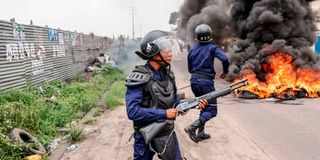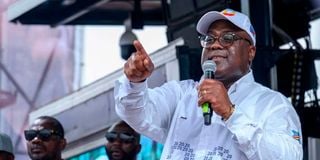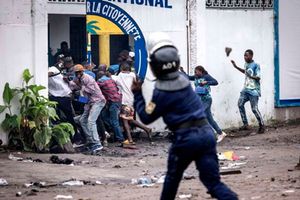
Democratic Republic of Congo olice officers stand next to a burning barricade during demonstrations by Opposition supporters in Kinshasa on December 27, 2023.
The Congolese Independent National Electoral Commission (Ceni) was this week preparing to publish the results of the general election, even as early figures showed President Félix Tshisekedi was going for another term in office.
Yet the biggest headache for the administration will be how to foster post-election calm in the wake of elections whose results have already been rejected by a number of his challengers and the Church.
Preliminary results showed that Tshisekedi dominated every region of the vast country and his Sacred Union of the Nation coalition members came out tops in legislative elections.
From January, ‘Fatshi Béton,’ as he is known to his admirers, will have to implement his policy through a parliament that will most likely be part of his coalition, from which the Prime Minister will be chosen.

President of the Democratic Republic of the Congo and leader of the Union of Democracy and Social Progress (UDPS) party, Felix Tshisekedi speaks to his supporters during a campaign rally at Sainte Therese in the Ndjili district of Kinshasa on December 18, 2023.
This will be a huge difference from his first term in office, when, for two years, Tshisekedi had to cope with a difficult cohabitation with the coalition of former president Joseph Kabila.
But, before that, he will have to deal with the contestations coming out of the vote results. The camps of Moïse Katumbi, Martin Fayulu and many other opponents have already chosen not to contest the forthcoming election results through the courts, citing lack of faith in the judiciary.
Church leaders on Thursday highlighted “numerous cases of irregularities” during the vote, which was extended over several days due to bureaucratic disarray.
At a news conference in Kinshasa, an election-observation mission run by the Catholic and Protestant churches also raised questions about the legality of the shambolic voting process.

Opposition demonstrators in Kinshasa on December 27, 2023. Police were deployed in the DR Congo's capital during the banned demonstration against recent elections in the country.
The mission noted “numerous cases of irregularities likely to affect the integrity of the results of the various ballots in certain places,” said Donatien Nshole, secretary general of the country’s Catholic episcopal conference.
Some 44 million people were registered to vote on December 20 in elections to choose a president, national and regional lawmakers and municipal councillors.
But election officials struggled to get voting materials to polling booths on time, leaving some people unable to cast ballots. Voting time was officially extended by an extra day to account for problems, but continued for days afterwards in remote areas.
The Catholic-Protestant observation mission, in a preliminary report released on Thursday, suggested that officially extending the vote by one day contravened electoral laws. Some people were also still casting ballots through to December 27, according to the mission, which urged the electoral commission to clarify the status of those votes.
Protest mobilisation
Nshole urged the electoral commission to break down preliminary vote results polling booth by polling booth. He added that “one candidate stood out from the rest, accounting for more than half of all votes cast,” without offering a name.
Partial results released by the electoral commission on Wednesday evening showed incumbent President Tshisekedi well ahead, with about 77 percent of the some 9.3 million ballots counted so far.
In Kinshasa, even before the Ceni announced the provisional results on Wednesday, Mr Fayulu and Denis Mukwege, another candidate, mobilised their supporters for street protests on December 27. But it they were quickly and violently dispersed by police who lobbed teargas canisters at them.
Peter Kazadi, Deputy Prime Minister in charge of the Interior and Security, warned “a handful of individuals” against taking the liberty “of defying the authority of the State.”

Congolese presidential candidate Moise Katumbi casts his ballot at the Bwakya School polling station in Lubumbashi on December 20, 2023.
In Lubumbashi and Kolwezi in southeastern Congo — Mr Katumbi’s stronghold — a battalion of soldiers has been sent in to deal with any trouble before it snowballs. Mr Kazadi himself travelled to the southern provinces to ensure everyone’s safety, “as there are several messages circulating calling for uprising and tribal hatred.”
In the provinces that form the greater Katanga, in the south, the election has exacerbated tribal hatred between the communities supporting Mr Katumbi and those in the greater Kasai, from where President Tshisekedi hails.
It is a hotbed of tension that Tshisekedi will have to work hard to extinguish during his last term of office, given he will need a united country to govern. Already, in the run-up to the elections, years-old separatist aspirations have resurfaced. Gédéon Kyungu, a former militia leader on the run, reappeared, calling for the independence of Katanga.
According to Kazadi, the government fears that the rebellion could start with electoral disputes in the greater Katanga and balloon into a bigger problem.
Historic handover
The DRC, the largest country both in the East African Community (EAC) and the Southern African Development Cooperation (SADC) blocs, has struggled to be a nation-state for the past 60 years. Its eastern front is a boiling pot of some 120 armed groups, each fighting for one grievance or other, and, often, representing a diverse tray of ethnic interests.
Tshisekedi became the first person in the country’s history to take over power by the ballot. In the past, regime change was often by the barrel of the gun.
Kazadi and Patrick Muyaya, the Government Spokesman, asked candidates who wish to contest the election results to wait until after Ceni publishes them, then challenge them legally by lodging complaints with the Constitutional Court.

A police officer throws a flash bang grenade at Opposition demonstrators in Kinshasa on December 27, 2023. Police were deployed in the DR Congo's capital Kinshasa on December 27, 2023 during the banned demonstration against recent elections in the country.
But Olivier Kamitatu, Mr Katumbi’s spokesman, rejected the idea, arguing that “the Constitutional Court is the last link in the axis of evil.”
The Katumbi camp believes that “the Constitutional Court can only confirm the fraud that was orchestrated and planned.”
“For these elections, the most expensive and fraudulent ever organised in the DRC, all we have left is Article 64 of the Constitution,” said Kamitatu.
Available remedies
The article, which opponents are threatening to use, stipulates that “all Congolese have a duty to defeat any individual or group of individuals who take power by force or who exercise it in violation of the provisions of the Constitution.”
This provision adds that “any attempt to overthrow the constitutional regime constitutes an imprescriptible offence against the nation and the State.”
At present, the demand by Fayulu, Katumbi, Mukwege and Joseph Kabila’s coalition to nullify the results and go back to the ballot is unlikely to be heeded.
The president-elect will have no time to rest when it comes to security in the troubled eastern provinces.

Congolese Opposition leader Martin Fayulu arrives at his party house ahead of a demonstration in Kinshasa on December 27, 2023. Police were deployed in the Democratic Republic of Congo's capital Kinshasa on December 27, 2023 during a banned demonstration against recent elections in the fragile central African state.
According to Julien Paluku, a former governor of North Kivu who is now Minister for Industry, there are around 200 local and foreign, armed groups in North and South Kivu and Ituri. Some of them often splinter, take a lull or coalesce around similar goals, making experts to give 120 as the average active number.
The most active, M23, the Allied Democratic Forces (a Ugandan proscribed group) and the Codeco, have been targeted with multiple operations carried out either by the Congolese army in collaboration with the Ugandan army or the Burundian army, or by armed self-defence groups such as the Wazalendo and the Maï Maï, which support the Kinshasa government.
A newcomer, the Alliance Fleuve Congo (Congo River Alliance) recently launched in Nairobi, wants to play its part in five provinces in the east, southeast and northeast of the country. The Alliance created by an M23 leader argues that it wants to topple the government in Kinshasa for not uniting the country.
Additional reporting by AFP







